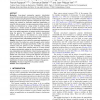Free Online Productivity Tools
i2Speak
i2Symbol
i2OCR
iTex2Img
iWeb2Print
iWeb2Shot
i2Type
iPdf2Split
iPdf2Merge
i2Bopomofo
i2Arabic
i2Style
i2Image
i2PDF
iLatex2Rtf
Sci2ools
165
click to vote
ISMB
2008
2008
Classification of arrayCGH data using fused SVM
Motivation: Array-based comparative genomic hybridization (arrayCGH) has recently become a popular tool to identify DNA copy number variations along the genome. These profiles are starting to be used as markers to improve prognosis or diagnosis of cancer, which implies that methods for automated supervised classification of arrayCGH data are needed. Like gene expression profiles, arrayCGH profiles are characterized by a large number of variables usually measured on a limited number of samples. However, arrayCGH profiles have a particular structure of correlations between variables, due to the spatial organization of bacterial artificial chromosomes along the genome. This suggests that classical classification methods, often based on the selection of a small number of discriminative features, may not be the most accurate methods and may not produce easily interpretable prediction rules. Results: We propose a new method for supervised classification of arrayCGH data. The method is a var...
Computational Biology | Copy Number Variations | DNA Copy Number | ISMB 2008 | Supervised Classification |
Related Content
| Added | 02 Oct 2010 |
| Updated | 02 Oct 2010 |
| Type | Conference |
| Year | 2008 |
| Where | ISMB |
| Authors | Franck Rapaport, Emmanuel Barillot, Jean-Philippe Vert |
Comments (0)

